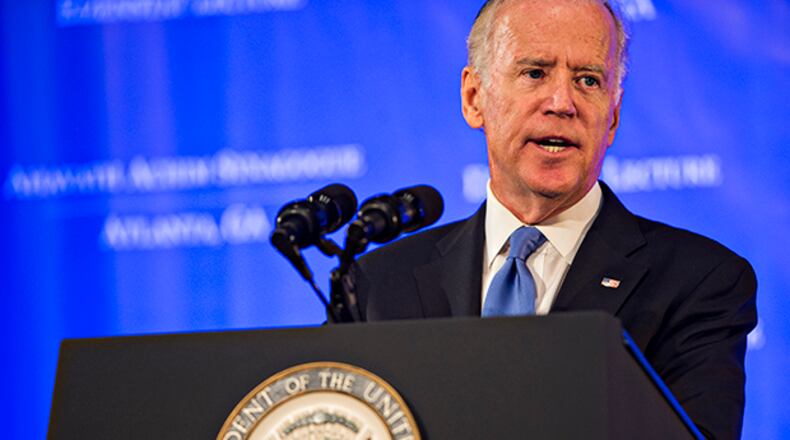Vice President Joe Biden met speculation that he might run for president head-on Thursday after a foreign policy address at an Atlanta synagogue, telling the crowd he’s weighing whether he has the “emotional energy” to run.
Responding to a question after his speech at Ahavath Achim synagogue, he said: “I have to be honest to you, and everyone who comes to me, that I can’t look you straight in the eye and say, ‘Now I know I can do it.'”
Speculation has mounted for months whether Biden would challenge Democratic front-runner Hillary Clinton for the party’s nomination. He told former Ambassador Stuart Eizenstat, who asked the question, he’s not concerned about whether he could line up the support and raise the money he would need. But he said he is held up by another factor.
He explained:
"The most relevant factor in my decision is whether my family and I will have the emotional energy to run. Some might think that's not appropriate. Unless I can go to my party and the American people and say I'm able to devote my whole heart and my whole soul to this endeavor, it would not be appropriate."
He added: “Can I do it? Can my family undertake what is an arduous commitment? …. The honest to God answer is I just don’t know.”
Like elsewhere in the country, Georgia’s Democratic establishment is firmly behind Clinton, but many rank-and-file Democrats are urging him to jump into the race because they fear the scandal-scarred former First Lady can’t win in November.
The trip comes after a swing through Florida, fertile fundraising ground for presidential contenders, where he ignored shouted questions about his future and delivered campaign-style speeches.
Pressure on Biden to make a decision is mounting. The first Democratic presidential debate is set for Oct. 13 in Nevada, and qualifying deadlines for many early-voting states are shortly after that.
Biden delivered a forceful defense of the Iranian nuclear deal earlier in the nearly-hourlong speech, telling the hundreds crowded into the Buckhead synagogue that the pact would help prevent Iran from getting a nuclear weapon.
In the process, he sought to position himself as the candidate who would continue President Barack Obama’s legacy were he to run for president.
“I could take a whole evening to speak to this, but this is a good deal,” he said. “And if we walk away from the deal, as some of our critics propose, we’d gain none of the benefits.”
He said sanctions would soon collapse, and Iran would be a “few short months away” from getting the material needed to build a nuclear weapon.
The Republican National Committee said in a statement that “Americans are overwhelmingly opposed this deal, rightly believing it will make the world less safe.”
Biden used the speech to highlight his foreign policy chops, outlining what would be his doctrine for military intervention. Such an attack, he said, would have to protect vital American interests and lead to sustainable results.
He rejected the calls from some Republican presidential candidates to deploy American ground forces to thwart the Islamic State’s spread through Iraq and Syria, saying that locals must “stand up” for themselves to bring a lasting peace. And he called for massive new investments in U.S. infrastructure and workforce training.
“If we do those two things, I guarantee you, we will be the most dominant force in the 21st century,” he said.
The Obama administration’s nuclear deal is a divisive subject within the Jewish community, and many Jewish and Israeli leaders loudly oppose the deal.
Large majorities in Congress are likely to oppose the agreement, but the Obama administration has locked up enough support from U.S. senators to ensure the pact will take effect because they cannot override his veto.
Biden sought to soothe concerns over the administration’s policy on Israel, calling the administration’s support for the Jewish nation “absolutely unshakable.”
“This president has done more to advance Israeli security than anyone in American history,” he said.
About the Author
Keep Reading
The Latest
Featured



